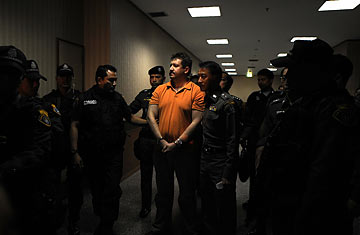
Thai commandos escort Russian arms dealer Viktor Bout, center, known as the "Merchant of Death" for his role arming rebels from Africa to South America, after a press conference at the Thai police headquarters in Bangkok on March 7, 2008.
On Aug. 19, 2009, a Learjet traveling from Cuba's Guantánamo Bay touched down at Westchester County Airport in White Plains, N.Y., carrying a dual Swedish and Lebanese citizen named Jamal Yousef. Twelve hours earlier, Yousef had walked out of a prison in Honduras, having been held on passport and weapons charges. But as he left, he found a group of masked men clutching automatic rifles waiting for him. Later, in court filings, Yousef would say he was forced into the cab of a truck and driven off into the night. According to his account, Yousef was then ferried by helicopter to the waiting jet. Once inside, he saw other passengers — men who were not wearing masks — and asked, "Who are you?"
The men were Drug Enforcement Administration (DEA) special agents, part of the agency's Special Operations Division (SOD), which one criminal defense attorney described as "the Navy SEALs of the DEA." The agents represent a small part of a broader effort by the U.S. Justice Department to confront suspected terrorists not just on the battlefield, but also in American courtrooms. Underpinning this is the theory that narcotics traffickers and terrorists have gone into business together. But, the reality is more complex and, despite dramatic arrests like Yousef's, it is not yet clear how the tactics employed in the expensive operations will hold up before judges and juries.
While few think of the DEA as a counterterrorism organization, since 2007 it has leveraged a little-known federal statute passed in 2006 to conduct sting operations across the globe, netting major figures including arms dealer Monzer al-Kassar and the "Lord of War" Viktor Bout by connecting the suspects to terrorism plots. That statute effectively created the team within the DEA's multiagency SOD to take on investigations in which drugs and terrorism crossed over, what policy types call a nexus.
But it is that nexus, and how investigators and prosecutors have sought to connect drug traffickers to terrorist groups, that has sparked criticism. The prosecutions are almost exclusively handled in New York's Southern District, where defense lawyers and some judges alike have questioned the DEA's tactics, raising criticism that investigators have "manufactured jurisdiction" and ensnared common criminals with no link to terrorism. The government argues that the stings are a fair, legal and necessary tool to infiltrate international drug and terrorist groups; and so far federal judges have agreed, refusing to dismiss cases for lack of jurisdiction. "Congress has given the DEA the capability and the authority to go after threats in sync with other law-enforcement partners," says Derek Maltz, special agent in charge of the SOD.
The DEA strategy in the Yousef case can be viewed as both effective and problematic. Like nearly every narcoterrorism operation undertaken by the DEA, it used U.S. informants posing as agents of terrorist groups. DEA informants representing themselves as operatives for FARC, the leftist rebel group in Colombia, sought out Yousef and a co-conspirator, saying FARC wanted to buy weapons in exchange for cocaine. Yousef, according to the government, offered to provide weapons stolen from U.S. forces in Iraq — a claim the defendant denies.
Pivotal to the government's case is the connection to both terrorism and a threat to the U.S. But in cases like Yousef's, in which the connection is offered up by U.S. informants rather than the target of the investigation, criminal defense attorneys argue that investigations are reaching beyond their authority to pursue targets who may otherwise be beyond the scope of their geographic jurisdiction. "The government creates imaginary links to terror organizations to ensnare people who may not actually have any other connection to terrorists," says Melinda Sarafa, a criminal defense attorney who is representing Yousef.
Prosecutors in the Bout case faced vocal criticism on this issue not just from the defense, but also the judge. In Bout's case, he went to a Bangkok hotel to meet with DEA informants who represented themselves as FARC operatives wishing to purchase weapons to be used against Americans. Judge Shira A. Scheindlin accused the government of "bravado" in making its case to prosecute the Russian citizen in the U.S. "There's a long line of cases where we look at the facts of each case," she said. "This one is weak." In response, prosecutors said they planned to submit evidence that Bout had researched FARC on his laptop prior to meeting with the U.S. informants disguised as the representatives of the rebel group.
